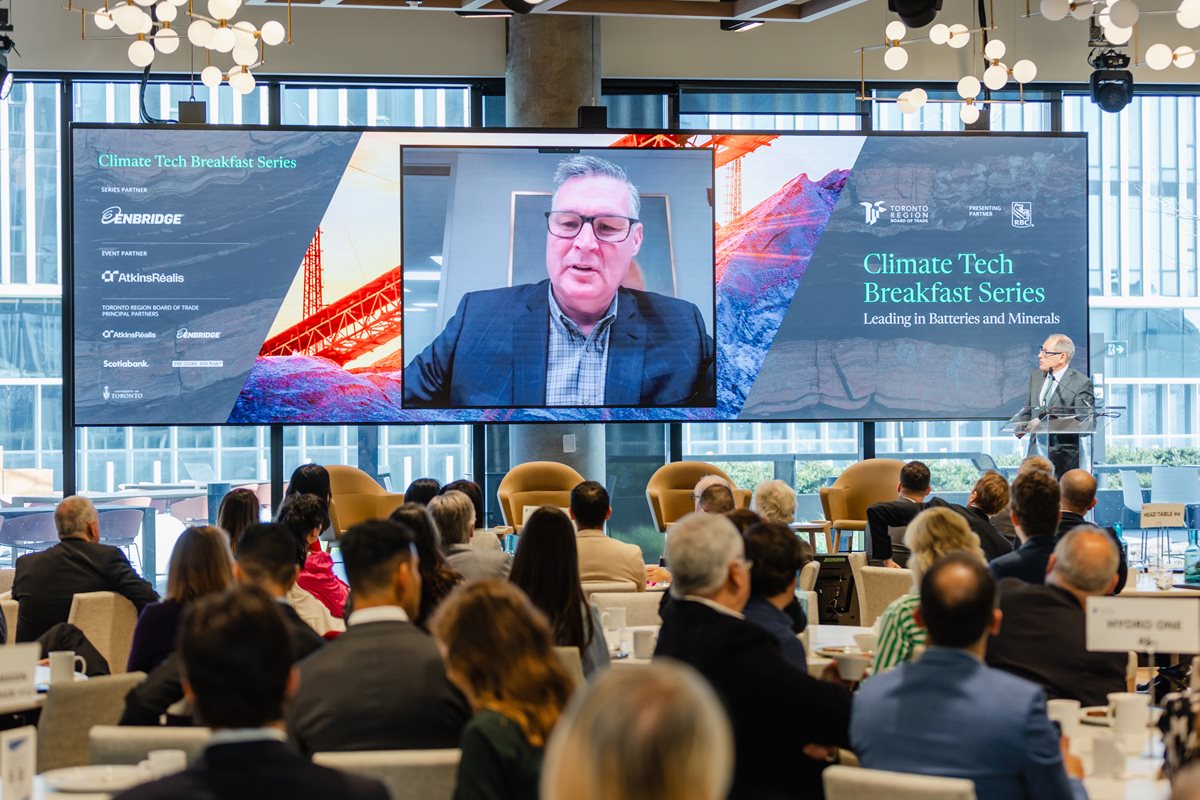
Ontario stands on the cusp of a monumental shift.
This was the resounding message at our inaugural Climate Tech Breakfast event, which centered on unlocking opportunities for innovation, economic growth, and sustainability within the batteries and critical minerals technology sector. The discussions revealed a transformative vision: leveraging Ontario’s abundant critical mineral resources to spearhead the global transition towards sustainable technologies. Leading figures in the industry converged to showcase how Ontario is not merely a participant in the green revolution but is strategically positioned to lead it.
This event came only two weeks after Honda announced it will build Canada’s first comprehensive EV Supply chain with a landmark $15-billion investment. With this signal announcement, we’re pushing $40-billion worth of investments in our EV sector and supply chain.

Jean Marc Leclerc, President and CEO of Honda Canada, highlighted the untapped potential of Ontario's critical minerals sector. "Ontario has a generational opportunity," Leclerc stated, underscoring the importance of securing an uninterrupted procurement for upcoming EV battery production slated to begin by 2028. Leclerc's vision for Ontario extends beyond meeting immediate demands; he is looking at a future where the province not only mines but also processes these critical minerals, ensuring cost competitiveness and supply security. Watch more of his remarks below:
Missed out on our discussion on Critical Minerals? Get tickets to our next event in the series today!
Today, we’re in a position where our traditional heavyweight manufacturing sector, autos, is creating significant new, and presumably, more sustainable demand for mining resources. As the Board’s President & CEO Giles Gherson said, “While we’re not there yet, Ontario is positioning itself to be one of the only places in the world that could build a full end-to-end supply chain all within one jurisdiction—from resource mining and processing, to battery components and batteries, to the EVs they power.”
David Isherwood, Vice President of Sustainable Mining, North America, at AtkinsRéalis, echoed this sentiment, pointing to Ontario's rich deposits of cobalt, copper, nickel, and platinum—essential for the green energy sector. "We're not refining enough of our own minerals here," Isherwood explained, suggesting a parallel with the uranium sector, where Ontario has successfully managed a complete lifecycle from mining to energy production. "It starts in Toronto," he affirmed, highlighting the city's pivotal role as the financing capital of the mining world.
WATCH: Why the success of Canada’s mining industry is anchored in Toronto
Stephen Crozier, Vice President of Sustainability at Wyloo, emphasized the need for radical transparency in the industry. The industry's current practices must shift from being perceived as mere marketing to becoming demonstrably accountable. "We need to show our work," Crozier urged, advocating for operations that are not only effective but also verifiable by independent parties.
Pierre-Philippe Dupont, Vice President of Sustainability at Canada Nickel, presented a compelling case for Canada to lead by example in ethical mineral sourcing. "It defeats the purpose that we’re using nickel in our batteries that comes from places like Indonesia," Dupont noted, criticizing the high environmental cost of cheaper nickel sourced overseas. His vision includes a robust domestic supply chain that leverages Canadian resources and technology to produce high-grade nickel essential for the EV market.

The speakers unanimously agreed the path forward involves more than just extracting resources—it requires innovation, responsible management, and a commitment to environmental and social governance that goes beyond current standards. They envision an Ontario that does not just participate in the global market but leads it by example, developing and commercializing technologies that pave the way for a sustainable future.
As we look forward to the next sessions in this series, which will explore hydrogen and small modular nuclear reactors, the message is clear: the time for Ontario to act is now. The province is not just positioned to meet the demands of the green transition but to drive it, shaping a future where economic growth and sustainability go hand in hand.
Thank you to our event partners.

